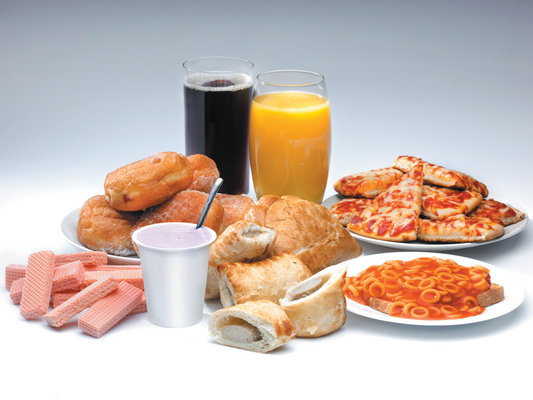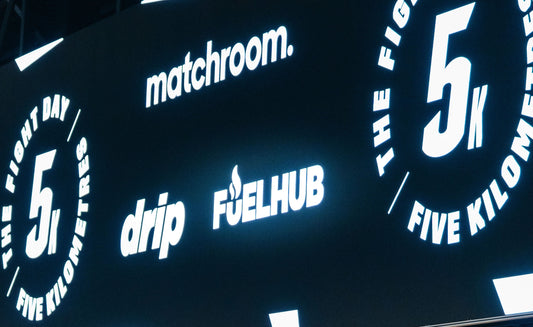Proper nutrition is a cornerstone of any runner's success. From improving performance to aiding recovery, fueling your body correctly can make a significant impact on your runs. This guide will delve into the essential nutrients and hydration strategies needed to optimise your performance. We'll explore what to eat and drink before and after your runs, as well as foods to avoid for maximum results.
What to eat before a run
Want to crush your next race or beat your PB? Fueling your body right is key. Here are some essential tips from our in-house nutritionist on optimising your pre-run nutrition for peak performance.
Carb loading
Carbohydrates are your body's primary energy source. To maximise your running performance consider carb loading in the days leading up to the event. Try to increase your carbohydrate intake to approximately 6 grams per kilogram of body weight. Focus on incorporating plenty of carb-rich foods into your meals and snacks — think whole grains, pasta, rice, bread, fruits, and vegetables. Don't forget to include liquid carbs like milk, fruit juice, and sports drinks for an extra energy boost.
Hydration
Hydration is the cornerstone of peak running performance. Dehydration can lead to fatigue, cramping, and decreased endurance. Start hydrating well in advance of your run by drinking plenty of water throughout the day, especially in the days leading up to a race. As a rule of thumb, aim to consume around 5ml of fluid per kilogram of body weight in the hours before your run.
Hydration is also crucial for maintaining optimal electrolyte balance. Electrolytes are essential minerals that help regulate bodily functions. To replenish these vital nutrients, many runners choose to incorporate electrolyte-rich sports drinks into their hydration plan.
Timing your nutrition for peak performance
Timing your nutrition intake on race day is crucial for optimal performance. Experiment with different strategies during training to find what works best for you. Here’s what we recommend:
-
60 minutes before: Stick to fluids with carbs, electrolytes, and caffeine for a fast-acting a top-up of energy and hydration
-
90 minutes before: A small, easily digestible snack can provide a quick energy boost before your run. We recommend our Fuel Hub banana bread.
-
3-4 hours before: Opt for easily digestible carbohydrates like oatmeal with berries, toast with avocado, or Greek yoghurt with honey. Avoid high-fibre foods that might upset your stomach.
What to eat after a run
Don't let post-run fatigue slow you down. Proper nutrition can help your body recover quickly, so you can bounce back stronger and build endurance over time.
Replenishing electrolytes
Electrolytes are crucial for maintaining fluid balance, nerve function, and muscle contraction. During your run, sweat depletes your body of these vital nutrients. Replenishing these lost electrolytes is therefore essential for a swift recovery. You can do this by incorporating electrolyte-rich foods such as bananas and leafy green vegetables into your post-run meals.
Prioritise protein
Protein is the essential nutrient for rebuilding and repairing muscle tissue after a run. During this type of exercise your muscle fibres experience microscopic damage. Protein, specifically the amino acids it contains, acts as the building blocks to repair this damage and promote muscle growth. A variety of protein sources can be incorporated into your post-run meal or snack. Greek yoghurt, eggs, chicken, fish, tofu, and lentils are excellent options.
What to avoid
While focusing on what to eat is essential, understanding what to avoid is equally important for optimal running performance. We recommend avoiding the following:
-
High-fibre foods (before a run): Consuming large amounts of high-fibre foods shortly before a run can lead to digestive discomfort. Opt for lower-fibre options in the hours leading up to your workout.
-
Spicy foods: Spicy foods can irritate the digestive system and cause discomfort during exercise. Enjoy them after your run instead.
-
Fatty foods: While healthy fats are important for overall nutrition, consuming excessive amounts of fatty foods, especially those high in saturated and trans fats, can hinder digestion and reduce energy levels.
-
Excessive caffeine: Moderate caffeine consumption can provide a performance boost but excessive intake can lead to jitters, dehydration, and disrupted sleep.
-
Foods you’re unfamiliar with: Your body is a well-tuned machine, and introducing unfamiliar foods can upset its delicate balance. Stick to tried-and-tested nutrition to avoid unexpected digestive surprises.
-
Running on an empty stomach: This can lead to fatigue, poor performance, and difficulty recovering from workouts.
Prepare for your runs with Fuel Hub
Our tailored meal plans provide the nutrition you need to reach your running potential. Take a look at our customised runner nutrition programmes here.


